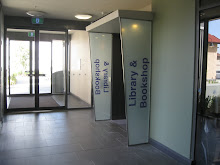Tuesday, August 17, 2010
Dry times
Thursday, August 12, 2010
Whaling (Issues in society series)

Unregulated commercial whaling has had a major impact
on the world’s whale populations. In spite of a complete
commercial whaling ban imposed by the International
Whaling Commission (IWC) in 1986, whales are still being
killed on a daily basis by traditional whaling nations such
as Japan, Norway and Iceland. And despite broad global concern for the
depleting whale populations, there is still ongoing debate among IWC
members over if and how whaling should continue. This book examines
the history of whaling and focuses on Australia’s prominent role in trying
to secure a compromise from the whaling nations, especially Japan,
with whom diplomatic relations have become strained. The book also
details Australian and international efforts to protect whales through
sanctuaries, research and legal frameworks. Aboriginal subsistence
whaling, ‘scientific’ whaling and commercial whaling ... what is entailed
in each of these practices? Is there room for political compromise, or
do these giants of the ocean need a globally binding conservation
commitment to survive in the world’s already over-fished oceans?
Monday, August 2, 2010
Overschooled but undereducated

This book synthesizes an array of research and shows how these insights can contribute to a better understanding of human learning, especially as this relates to adolescence. By mis-understanding teenagers’ instinctive need to do things for themselves, society is in danger of creating a system of schooling that so goes against the natural grain of the adolescent brain that formal education ends up unintentionally trivialising the very young people it claims to be supporting. By failing to keep up with appropriate research in the biological and social sciences, current educational systems continue to treat adolescence as a problem rather than an opportunity.
This book is about the need for transformational change in education. It synthesizes an array of research from both the physical and social sciences and shows how these insights can contribute to a better understanding of human learning, especially as this relates to adolescence. The book was conceived through a series of international conferences, and considers the education systems in Scotland, Wales, Ireland, Canada, the US, Australia and New Zealand. Its intention is to shake education out of its two-century’s-old inertia. In the saga of the ages, if a generation fails, the fault lies squarely with the previous generation for not equipping them well enough for the changes ahead. The most immoral thing a person can ever say is: ‘This will last out my time’.


